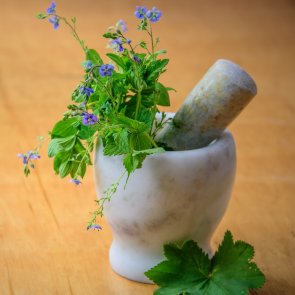Botanical Ingredients in Cosmetics and Their Benefits
 People have used various plants as medicines for thousands of years. And the every first cosmetics were based on plant-derived ingredients, too. Although modern cosmetics can’t be more different from those very first skin and hair care products, the best of them contain botanical ingredients. What exactly do we mean by botanical ingredients and what are their benefits?
People have used various plants as medicines for thousands of years. And the every first cosmetics were based on plant-derived ingredients, too. Although modern cosmetics can’t be more different from those very first skin and hair care products, the best of them contain botanical ingredients. What exactly do we mean by botanical ingredients and what are their benefits?A botanical ingredient is an ingredient of a personal care or cosmetic product that originates from plants. Historically, different part of plants (stems, leaves, flowers, roots, seeds, fruits) have been used to produce natural colorants, surfactants, moisturizers, etc. For example, a number of plant species are rich in saponins, a class of chemical compounds with surfactant properties. These plants can be used as laundry detergents or natural shampoos.
Botanical ingredients are classified based on their chemical structure and properties as well as on how they are derived from plants. The main groups of such ingredients include carrier oils, essential oils, plant extracts, floral waters (herbal distillates), juices, plant powders, etc. Although the classification seems pretty clear, there still is some room for confusion. For example, a number of ingredients that are commonly referred to as oils (burdock oil, monoi oil) are in fact oil-based extracts produced by soaking plant parts in a carrier oil.
Although botanical ingredients have always been used in cosmetics, they have become increasingly popular over the last three decades thanks to greater standardization and quality control in the industry, new research in the pharmaceutical and cosmetics industries, and an increasing number of environmentally conscious consumers who prefer their cosmetic and personal care products formulated with safe and natural ingredients.
So, what are the main benefits of botanical ingredients? First of all, the properties of plants and plant-based ingredients have been thoroughly studied and are well understood. Unless you have allergy, your body is going to react well to most botanical ingredients. Moreover, your body automatically knows how to process them with a maximum benefit because they’re natural.
Plant-based products tend to be gentler on the skin than synthetic ingredients, and they are generally considered safe for people with sensitive skin. However, you should keep in mind that “natural” doesn’t necessarily mean “compatible”. Allergies can be very unpredictable, so you should always test a product on a small area of your skin before using it.
Second, botanical ingredients are packed with moisture, vitamins, antioxidants – in other words, with all the substances required to bring a plant to life. A clever combination of plant-based ingredients has everything to keep your skin healthy and glowing. For each and every need of your skin, there’s a botanical ingredient: carrier oils nourish and moisturize the skin, extracts can have soothing, regenerative, revitalizing and other properties, essential oils kill pathogenic microbes and prevent inflammation, etc.
Of course, not all botanical ingredients are equally good for you. The quality of raw materials and the method of extraction have a great impact on the content of active substances in the final product, as well as its overall quality. The best way to make sure that your skincare products are up to par is to choose brands that use certified organic ingredients. In the United States, products are certified organic by the United States Department of Agriculture (USDA). In Europe, there is a number of public and private organic certification bodies.
Photo by PhotoMIX Ltd. from Pexels
Breadcrumbs
Filters
- Face, Body, Hair
Tags
Related Articles
- 6 Benefits of Olive Squalane for Your Skin, 5+1 Benefits of Activated Charcoal for Your Skin, Hair and Teeth, 7 Skin Benefits of Cambrian Blue Clay, Skin Benefits of Snail Secretion Filtrate and Its Use in Cosmetics